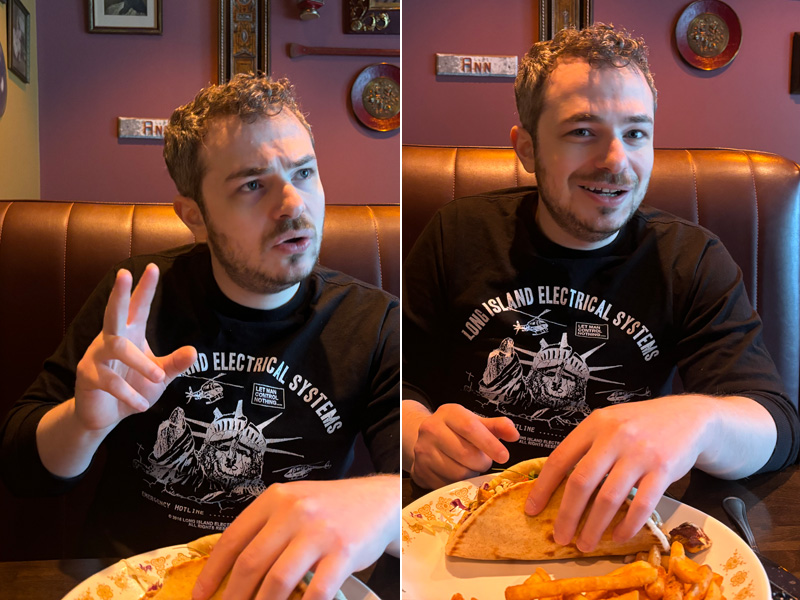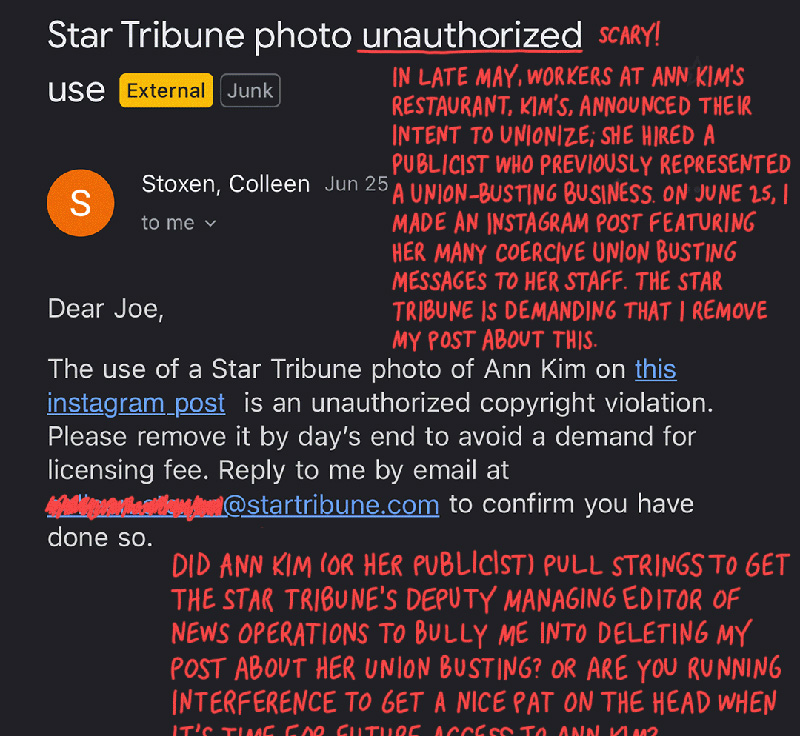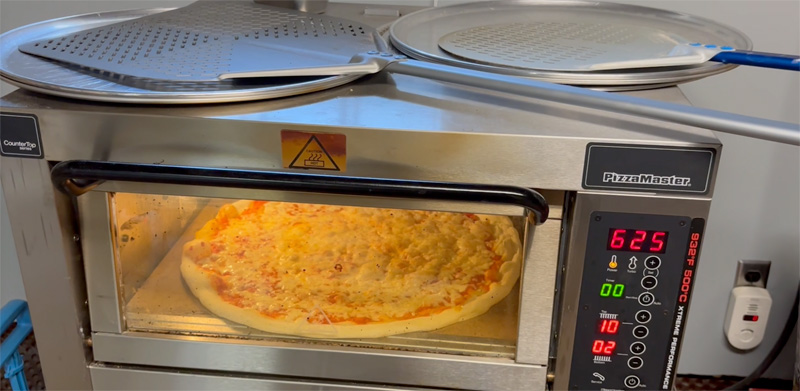Nobody reports on Minnesota food and drink like The Heavy Table. This story was made possible by our subscribers – join their ranks and get original newsletters every Friday covering dining; restaurant news; beer, wine, and spirits; and home cooking.
If you start researching the biography of Saint Paul-based Instagrammer Joe Rosenthal, one of the first things that pops up is an r/bon_appetit Reddit thread from two years ago entitled “What can be done about Joe Rosenthal?”
Joe Rosenthal, argues the original anonymous poster, is a bully. He’s a coward who calls for accountability without understanding it. He’s a provider of negativity.
Another way to view it: Rosenthal was a prominent critic of a toxic workplace at Bon Appetit that marginalized and mistreated minority contributors. The issue became an industry-shaking story in 2020 that Rosenthal reported on and boosted with widely-shared parody Bon Appetit magazine covers; it eventually gained national traction and led to an overhaul of the magazine’s video team and the replacement of its editor in chief.
While Instagram is his medium, Rosenthal is anything but a typical “influencer.” He deals in research and facts, the harder the better – last month he changed the debate about unionization at Ann Kim’s restaurant Kim’s by working with anonymous sources to leak anti-union emails sent by management to employees.
When Rosenthal goes on the attack he pursues targets – restaurateurs, Internet celebrities, major newspapers – who are able to look after themselves, and have the fans and/or lawyers and/or friends in the media to do so. And far from following the traditional “influencer” agenda of making himself look lovable and relatable, Rosenthal spares no invective in pursuing accountability in a world where accountability is in scarce supply.

Rosenthal grew up in upstate New York, with strong family ties to New York City. His father was diagnosed with dementia when he was still a child, so he was largely raised by his mom. In 8th grade, when his father’s illness was at a particularly difficult point, his school sent a letter to his mother saying that Rosenthal had “no aptitude for mathematics” and should be moved back a grade in both math and science. Today, he’s a professional mathematician; his PhD thesis was focused on developing predictive models related to Alzheimer’s disease.
“I don’t think my brain ever really ticks the way people expect it to tick,” says Rosenthal. “[In the field of math,] more valuable than: ‘Can you do computation?’ is the creativity, the way you view problems. The fact that I’m not wired the way other people I know is sometimes a benefit.”
INSTAGRAM WARRIOR
In addition to his professional work of improving diagnostics for cancer and other diseases, Rosenthal has two major projects: the first is a passionate, arguably exhaustive pursuit of perfection when it comes to making art-meets-science American folk foods including pizza, hoagies, and burgers, as artfully documented on his website Richard Eaglespoon.
The second is using his 34K follower Instagram account to stick it to people in the food world who he views as bad actors: bullies, union busters, sloppy practitioners of food safety, racists, and more. His tone can be self-righteous, confrontational, and dramatic. However, it’s also never boring, and it always comes backed by receipts. It’s a stark contrast to the celebratory, booster-ish tone that is standard fare in the world of food journalism.
He’s made nationally noted dents in stories as diverse as the Bon Appetit video inequality story, the revelation of food safety and adverse workplace problems at the high-profile Los Angeles restaurant Sqirl in 2020, and – most recently, and most locally – the flurry of anti-union emails penned by Kim’s owner Ann Kim in the run-up to a unionization campaign at the Uptown restaurant last month.
“I went to Kim’s, I enjoyed Kim’s,” says Rosenthal. “Then I started noticing they were doing reservations, and then it’s DoorDash. Then the staff is like: ‘We’re unionizing.’ I’ve covered a couple union stories [and] I’ve seen the union-busting playbook,” he says.
Rosenthal’s stance is that once a restaurant staff gets to the point where they announce an interest in unionizing, conditions have inevitably gotten bad. “I will always support [employees’] right to vote, unimpeded,” he says. “That doesn’t mean that unions are always the answer, but we know where the power is.”
Once Rosenthal started posting about Kim’s on Instagram, he also reached out and started talking to the employees doing the organizing. They tipped him off to an anti-union email campaign by Ann Kim – a series of eleven messages to employees between June 10 and June 24. “So I eventually find a source on the internal messages and I start getting sent the messages,” says Rosenthal. “And I corroborate the messages to make sure they’re real.”
Rosenthal ended up sharing the messages on Instagram, a move that got picked up and amplified by sources including the Star Tribune, Racket, and BringMeTheNews.
“When [Jason] DeRusha reposted it [on Instagram], I feel like something shifted,” says Rosenthal. “I felt good about the response. Everybody was mad at me, but the cat was out of the bag, and everyone in the Twin Cities food world was looking at my work. It definitely shifted the debate.”
Rosenthal added fuel to the fire by creating an image featuring a Star Tribune photo portrait of Ann Kim, a “Union Busters” graphic in the style of the Dave and Buster’s logo, and text from her emails: “You Matter. Your Voice Matters. But only if you vote no.” (“You matter,” “Your voice matters,” and “vote no,” are all direct quotes from Kim’s June 13 email; “but only if you…” is Rosenthal’s paraphrase of her sentiments.)
And then, as is so often the case in contentious stories like this one, a major twist: The Star Tribune contacted Rosenthal and demanded that he pull down his Ann Kim image (and, necessarily, the Instagram post that it resided in.)
Rosenthal argues that his use of the image is non-commercial, transformative, and a parody, and therefore protected by the doctrine of fair use. “The reason I chose the Star Tribune’s photo and not Ann Kim’s photo is that I didn’t want to deal with the headache of a bad faith copyright claim,” he says. “I didn’t think a newspaper would [dispute my use of the photo].”

“My work is non-commercial, it’s taking on union busting, it’s a parody, it doesn’t compete with Star Tribune’s ability to license their photo,” Rosenthal adds. “The media who have done nothing but lionize these people shouldn’t be the ones to determine how we critique them.”
A DMCA request by the Star Tribune resulted in Instagram taking down the Ann Kim photo post. Rosenthal says that he expects it to be restored in a couple of weeks, unless the paper files a court case and a judge upholds its removal.
Heavy Table reached out to Colleen Stoxen at the Star Tribune for comment. Stoxen is the deputy managing editor for news operations who contacted Rosenthal about the image; she did not respond to our request.
OBSESSION WITH IMPROVEMENT
One of the most commonly leveled charges against anyone who writes in the food media sphere is that the writers talk the talk without walking the walk. If you’ve read Rosenthal’s deep dive into pizza, for example, you wouldn’t make that assumption about him – it’s a mile deep and informed by countless attempts to obtain an elusive perfect pie.
“I kind of view How to Pizza as almost like a journal article – reproducibility is the name of the game, and if I don’t have that, it’s not worth anything,” says Rosenthal. He’s heartened to see other people have success with the recipe, but he doesn’t make any claims about it being “authentic” per se – it’s a personal goal that he’s chasing, while documenting the voyage.
“There’s not a real food that ever tasted like that, and the only way I can have that is to keep pushing myself,” he says. “I’ve never had a pizza that is quite [like the pizza] that I make. But it’s kind of my memory of New York-style pizza.”
Rosenthal’s method of careful iteration and taking care to make a dish the hard way – or, one could argue, the right way – goes all the way back to his childhood, he says, to the omelet station at the Omni Hotel in Albany. “I used to watch the guys [making omelets],” he says. “And it was different from how other people did it – where usually you take the lazy way and put the eggs and vegetables together and just sort of do it. At the Omni, they’d saute the vegetables, then they’d add the egg and keep moving it and I kind of internalized what they were doing as a kid, and I started trying to make omelets.”
Rosenthal’s evolution into a passionate home pizza chef helped transform his life. His engagement with the pizza community in Pittsburgh, PA kicked off his insider involvement with food scenes around the country. And his frustrations with pizza making helped to sharpen his sense of purpose as a writer.
“Part of why I talk so much about ‘this is a bad pizza recipe’ is because I failed because of these recipes,” he says. “I couldn’t handle the dough because the dough was too wet. I couldn’t stretch it because the gluten wasn’t right and I didn’t have the right methodology. Almost no generalist recipes talk about how to ball the dough and stretch it beyond a 10-inch pizza.”

Eat pizza at Rosenthal’s house and you’re in for a restaurant-like experience. He’s got a spiral mixer that’s suited for commercial test kitchens, a dedicated oven, special dough proofing containers to help maintain spherical dough balls, and two peels (one for launching pizzas into the oven, one for retrieving “because you don’t want to pollute the launching peel with oil and all that stuff.”) The resulting pizza is thin, foldable, impeccably balanced, and delicious – if you backed me into a corner and demanded a ranking, it would easily make the area’s top 10.
To bring things full circle, I asked Rosenthal about that Bon Appetit thread, which seemed to sum up a lot of what his own critics dislike about his work and his approach.
“I think those people were upset that their faves were problematic and they were shooting the messenger,” says Rosenthal. “And they just wanted me to shut up. If you read the completion of that thread, there’s nothing to be done. I don’t read comments sections at this point.”

